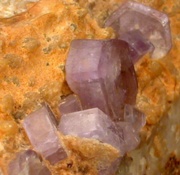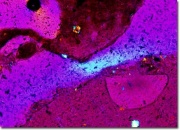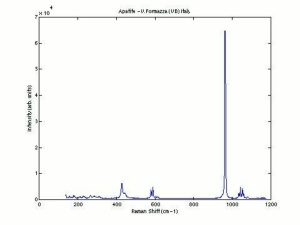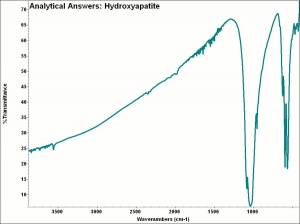Difference between revisions of "Apatite"
Jump to navigation
Jump to search
| Line 8: | Line 8: | ||
asparagus stone (green); moroxite (blue); fluorapatite; phosphorite; Apatit (Deut.); apatite (Fr., Port.); apatito (Esp.); apatiet (Ned.); apatyt (Pol.) | asparagus stone (green); moroxite (blue); fluorapatite; phosphorite; Apatit (Deut.); apatite (Fr., Port.); apatito (Esp.); apatiet (Ned.); apatyt (Pol.) | ||
| − | |||
[[[SliderGallery rightalign|Apatiteitaly1.jpg~Raman (U of Parma)|aaiAPATITE.jpg~FTIR (AAI)]]] | [[[SliderGallery rightalign|Apatiteitaly1.jpg~Raman (U of Parma)|aaiAPATITE.jpg~FTIR (AAI)]]] | ||
| − | |||
== Physical and Chemical Properties == | == Physical and Chemical Properties == | ||
* Hexagonal crystals in prismatic and tabular forms | * Hexagonal crystals in prismatic and tabular forms | ||
| + | * Cleavage is indistinct | ||
| + | * Fracture = uneven to conchoidal | ||
* Luster = vitreous to resinous | * Luster = vitreous to resinous | ||
* Streak = white | * Streak = white | ||
* Transparent to opaque | * Transparent to opaque | ||
| − | * | + | * Fluorescence = colorless stone=not diagnostic: blue stone= blue in LW and SW; violet stone= greenish yellow in LW, light purple in SW |
* Pleochroism = colorless stone=very weak to weak; blue stone=strong trichroism with blue, yellow and colorless | * Pleochroism = colorless stone=very weak to weak; blue stone=strong trichroism with blue, yellow and colorless | ||
| − | |||
{| class="wikitable" | {| class="wikitable" | ||
|- | |- | ||
! scope="row"| Composition | ! scope="row"| Composition | ||
| − | | | + | | Ca<sub>5</sub>(PO<sub>4</sub>)<sub>3</sub>F |
|- | |- | ||
! scope="row"| Mohs Hardness | ! scope="row"| Mohs Hardness | ||
| − | | | + | | 5.0 |
|- | |- | ||
! scope="row"| Density | ! scope="row"| Density | ||
| Line 47: | Line 46: | ||
* Jack Odgen, ''Jewellery of the Ancient World'', Rizzoli International Publications Inc., New York City, 1982 | * Jack Odgen, ''Jewellery of the Ancient World'', Rizzoli International Publications Inc., New York City, 1982 | ||
* C.W.Chesterman, K.E.Lowe, ''Audubon Society Field Guide to North American Rocks and Minerals'', Alfred A. Knopf, New York, 1979 | * C.W.Chesterman, K.E.Lowe, ''Audubon Society Field Guide to North American Rocks and Minerals'', Alfred A. Knopf, New York, 1979 | ||
| − | * Wikipedia: | + | * Wikipedia: [https://en.wikipedia.org/wiki/Apatite Apatite] (Accessed Aug. 30 2005 and Dec 2022) |
* ''Van Nostrand's Scientific Encyclopedia'', Douglas M. Considine (ed.), Van Nostrand Reinhold, New York, 1976 | * ''Van Nostrand's Scientific Encyclopedia'', Douglas M. Considine (ed.), Van Nostrand Reinhold, New York, 1976 | ||
* Random House, ''Webster's Encyclopedic Unabridged Dictionary of the English Language'', Grammercy Book, New York, 1997 | * Random House, ''Webster's Encyclopedic Unabridged Dictionary of the English Language'', Grammercy Book, New York, 1997 | ||
Latest revision as of 10:56, 21 December 2022
Description
A naturally occurring mineral of calcium fluor-phosphate. Apatite is found throughout the world with numerous deposits in Europe (Germany, Spain) and North America (Ontario, Massachusetts, California, Mexico). It is colorless when pure, but impurities can give it a white, green (asparagus stone), blue (moroxite), yellow, or violet color. Bones, both human and animal, are composed of Hydroxyapatite, mixed with protein (Ossein) and small amounts of other minerals, such as Calcium carbonate. Apatite is commercially used as a fertilizer.
Synonyms and Related Terms
asparagus stone (green); moroxite (blue); fluorapatite; phosphorite; Apatit (Deut.); apatite (Fr., Port.); apatito (Esp.); apatiet (Ned.); apatyt (Pol.)
Physical and Chemical Properties
- Hexagonal crystals in prismatic and tabular forms
- Cleavage is indistinct
- Fracture = uneven to conchoidal
- Luster = vitreous to resinous
- Streak = white
- Transparent to opaque
- Fluorescence = colorless stone=not diagnostic: blue stone= blue in LW and SW; violet stone= greenish yellow in LW, light purple in SW
- Pleochroism = colorless stone=very weak to weak; blue stone=strong trichroism with blue, yellow and colorless
| Composition | Ca5(PO4)3F |
|---|---|
| Mohs Hardness | 5.0 |
| Density | 3.17-3.23 g/ml |
| Refractive Index | 1.63-1.67 |
| Birefringence | 0.002 - 0.008 |
Resources and Citations
- Gem Identification Lab Manual, Gemological Institute of America, 2016.
- Mineralogy Database: Apatite
- G.S.Brady, Materials Handbook, McGraw-Hill Book Co., New York, 1971 Comment: p. 603
- Richard S. Lewis, Hawley's Condensed Chemical Dictionary, Van Nostrand Reinhold, New York, 10th ed., 1993
- Sue Fuller, Rocks and Minerals, DK Publishing, Inc., New York City, 1995
- Jack Odgen, Jewellery of the Ancient World, Rizzoli International Publications Inc., New York City, 1982
- C.W.Chesterman, K.E.Lowe, Audubon Society Field Guide to North American Rocks and Minerals, Alfred A. Knopf, New York, 1979
- Wikipedia: Apatite (Accessed Aug. 30 2005 and Dec 2022)
- Van Nostrand's Scientific Encyclopedia, Douglas M. Considine (ed.), Van Nostrand Reinhold, New York, 1976
- Random House, Webster's Encyclopedic Unabridged Dictionary of the English Language, Grammercy Book, New York, 1997
- The American Heritage Dictionary or Encarta, via Microsoft Bookshelf 98, Microsoft Corp., 1998



